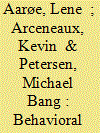|
|
|
Sort Order |
|
|
|
Items / Page
|
|
|
|
|
|
|
| Srl | Item |
| 1 |
ID:
153780


|
|
|
|
|
| Summary/Abstract |
We present, test, and extend a theoretical framework that connects disgust, a powerful basic human emotion, to political attitudes through psychological mechanisms designed to protect humans from disease. These mechanisms work outside of conscious awareness, and in modern environments, they can motivate individuals to avoid intergroup contact by opposing immigration. We report a meta-analysis of previous tests in the psychological sciences and conduct, for the first time, a series of tests in nationally representative samples collected in the United States and Denmark that integrate the role of disgust and the behavioral immune system into established models of emotional processing and political attitude formation. In doing so, we offer an explanation for why peaceful integration and interaction between ethnic majority and minorities is so hard to achieve.
|
|
|
|
|
|
|
|
|
|
|
|
|
|
|
|
| 2 |
ID:
177188


|
|
|
|
|
| Summary/Abstract |
Widespread distrust in politicians is often attributed to the way elites portray politics to citizens: the media, competing candidates, and foreign governments are largely considered responsible for portraying politicians as self-interested actors pursuing personal electoral and economic interests. This article turns to the mass level and considers the active role of citizens in disseminating such information. We build on psychological research on human cooperation, holding that people exhibit an interpersonal transmission bias in favor of information on the self-interested, antisocial behavior of others to maintain group cooperation. We posit that this transmission bias extends to politics, causing citizens to disproportionally disseminate information on self-interested politicians through interpersonal communication and, in turn, contributes to distrust in politicians and policy disapproval. We support these predictions using novel experimental studies, allowing us to observe transmission rates and opinion effects in actual communication chains. The findings have implications for understanding and accommodating political distrust.
|
|
|
|
|
|
|
|
|
|
|
|
|
|
|
|
|
|
|
|
|